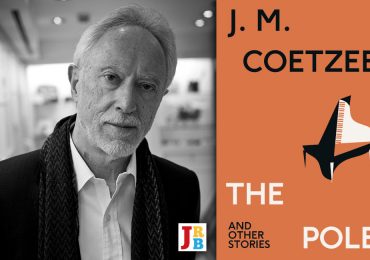New original fiction in The JRB.
~~~
Bakang Goes to Sea
By Franki Jenkins
Nolwazi
During Rhodes Must Fall every woman and her cousin started to get The Call. When my fits began, mom and I freaked out and assumed it was happening to me too. We called in my aunt, the real matriarch in the family. Luckily, she never believed I could amount to anything, and swiftly cast out our superstitions by asserting that we were a Jehovah’s Witness family, and that I was probably just looking for attention. The end outweighs the means, as they say. Happy to escape a future as a traditional healer, I let myself be passed around from one ‘biomedicine’ psychological practitioner to another. Finally got a diagnosis for bipolar disorder, a bunch of pills I needed to take regularly, and the conviction that there was something very, very sinister about that university—not least because of how many of us went mad or tried to kill ourselves there. And that’s why, of course, I decided to stay on for a Master’s, and then a PhD.
The fits diminished with time, to the point where I really judged myself for almost, almost, believing that they had been The Call, and that subsequently, even more absurdly, that The Call had been for me. Of course, rejecting The Call is supposed to make everything worse—the fits, or whatever inconveniences or health side effects manifest within you. The Call is not desired. The responsibility of being a sangoma is huge, and it means that you probably won’t be able to pursue most of the things you’d envisioned for yourself.
But there is no escaping the reality that receiving The Call means you’re special. Chosen. That all the bad things that had been happening to you happened for a reason. I judged myself for believing that I’d been on the brink of witnessing truths only a select group of human beings had access to. Now, I’m pretty much settled into a routine of not being special, and I’m pleasantly surprised by the comfort that brings me. Perhaps the loneliness of writing a PhD presents a way of feeling special. Misunderstood, certainly. My special power has become boring the living daylights out of anyone who asks about my research.
I guess that’s how Jakobus got bored of me. I’m still shaken that he, an Afrikaans guy with no degree, who is into Dungeons and Dragons and not much else, working at a baked goods distributor as a floor manager, could get tired of me. Look, we’ve established that I’m not special, but I have interests. At the very least, on the social and romantic fronts, I am sought after. At first, he was surprised that I even matched with him on the app. On our second date, he picked me up in his kaput little car, some niche Fiat from the early 2000s, which he’d clearly tried to ‘clean’ without ever having had to clean his own room properly. Oh, did I mention he still lives with his parents? Of course he does. Anyway, he drove us to Camps Bay with a fully-packed picnic, and on later dates he even learned to pack wines that I like. The more dates went by, the more I became comfortable with him—and the less enthusiasm I saw in his texts. Within the space of six months, he was writing to me with the exhausted tolerance of a white boy dealing with his over-involved and lonely mother. Even though he never had any plans, organising our hangouts in advance so I could accommodate him in my full diary didn’t suit him.
Let’s be spontaneous, he said.
Then we might not see much of each other, I said.
As usual, I was right. As usual, he didn’t seem to mind. He was satisfied with his life, whether or not I was in it. Meeting in Obs tonight to ‘talk’ had obviously been a Nolwazi initiative, and he showed up like a teenager called to the headmaster’s office for an offence he didn’t think was either offensive or interesting. He was dying to leave from the start.
Scorched earth policy—apparently that’s the term for making the relationship intolerable when you don’t have the balls to just end the thing yourself.
I asked him to leave, and when he did, I didn’t know where to go next myself. I walked all the way down Lower Main without really seeing anyone, in spite of all the people asking for money and company. I stopped at Trill Road and started a breathing exercise I’d recently learned. ‘Hello my love,’ said a private school voice emerging from a very handsome young man’s body, ‘I’m Bakang. Do you know where I can find an old-fashioned cab around here? I really want to go to Sea Point, but I would prefer not to use the apps.’
Sinazo
Whenever I have an episode, I know what I need to do. I put on pants, and I get out of my house. I walk to Lower Main, and get myself a pack of Marlboro Red Beyond from the convenience store. Then, I walk to where I always meet Bakang.
It never takes him long to appear, shame, and he’s always looking for a cab—the old-fashioned kind, not one from the internet. The first time I met him I assumed he was a ghost, because I always seem to meet ghosts during my episodes. But his private school accent made me wonder. He just sounded too contemporary. I don’t mess with ancestors, though, so when he asked I called my old cab hookup Blessing, just to be on the safe side.
When Blessing arrived he could also see Bakang. Probably not an ancestor, then. Bakang got in, thanking me profusely, and they drove away together with the money I’d given him.
Now we do the same thing every time, and I do it intentionally, because that’s the only way to make Cafe Ganesh—that run-down bar from the 2000s with the red interior—open again. I don’t know how it works, and I don’t mind paying for Bakang. Whatever he is, the poor soul is lost. And he gets me into Ganesh, which is where I go to be found.
Martin
You know when you think back on the last few weeks, and you can only tell that you’ve been really busy, but when it comes to the particulars of what you actually did you hit a blank? That’s been me the past three years. The years to come? I see them with as much anticipation as a visit to the Department of Home Affairs. That’s why I moved to Obs. At least here, when I get home from work in the CBD, I pass colourful buildings and activity on the street—international students having conversations with neighbourhood residents, and so on. Living in such a lively place is a welcome distraction after the quiet of Pinelands—even if I had more space there.
When I got into product management, I thought I’d hit a professional goldmine. The salary was ample, the data bootcamp I’d done at the start of the pandemic was put to good use, and working with different teams was just what my personality needed. One year in, though, I had to acknowledge that my targets, my time, my products were ultimately beholden to the whims of our founders and the intransparent conversations they had with their investors. The stresses piled up as the animosity from our pragmatic, no-bullshit team of engineers increased with each new exciting pivot that I had to instruct them to implement. Our products pivoted further and further away from what anyone wanted or needed. If our entire startup disappeared overnight, not a single thing would change on planet Earth. And I found myself burned out, hated by my team, and exhausted for an empty cause.
I met Bakang one night when I went for a mental health walk against my better judgement—it’s not safe, but I was beside myself with stress. He asked me if I knew where to get a cab—odd in the age of ride-hailing apps. I was scared, but I must confess that I felt less scared when I heard his effeminate voice with its private school touch. He said he didn’t have a smartphone because he didn’t want people to find him online.
I phoned a guy who used to help me, and he happened to be in Woodstock. He was happy to do a cash ride to Sea Point, and I waited on the sidewalk with Bakang for him to arrive. Bakang kept mentioning that I should be careful with smartphones—something I’d heard before in Obs, too many times. When Blessing arrived, Bakang got in and thanked me effusively, calling me ‘my love’. Blessing drove away, nodding at me while Bakang waved like I was a dear friend.
I was starting to cross the road, listlessly, when a warm glow illuminated the tarmac. A bar with its lights on had appeared just ahead of me. It was the old Cafe Ganesh—the one everyone told me had closed years back because they’d found heroin needles there. This girl I’d had a crush on back in varsity days used to go there to perform spoken-word poetry.
I decided to go inside.
Sinazo
Sometimes I feel like I’m losing my grip. I’ll be sitting with a group of friends, and they’ll be talking about their jobs. That’s all anyone talks about these days. Except me. Because I don’t have one. I don’t know if I have what it takes. They send me job ads, and I miss the deadline. I try to picture myself in the roles they describe. Content writing for a tourism startup. Content manager for an Internet of Things consulting company. Customer Success agent for an e-learning software company. If I’m being honest, I don’t even know what half of the jobs are. I can’t picture what I’d be doing. The descriptions of these jobs read like academic papers where you only realise you haven’t been reading till you get to the end of the page. The letters on the screen and your eyes have been interacting, but the information itself has stayed where you found it. My mind resists the words, because it doesn’t want them. My mind wants things that don’t earn you money. My CV reflects that perfectly. The thing has nothing in it. Until very recently, I was sending it around as a .docx.
My white friends are the most involved in trying to help me get a job. It is, finally, a way they can try to redeem themselves. But they are also quick to get annoyed at me for not doing things right. Not replying fast enough. Not jumping at every opportunity. They cannot compute that I can be so desperate for a job, so low on cash, but yet so resistant to their offers. They want to solve my problem as if it’s something that can be fixed with a one-year contract in a white-dominated space, and a salary so low it hardly covers your rent. Their exasperation exhausts me. My inability to explain what’s holding me back exhausts me. How I have no good options exhausts me. The ghosts I keep seeing exhaust me, mostly because I can’t talk about it to anyone without seeming crazy.
I was made for a life of leisure. A life of pleasure. When did everyone around me get that protestant work ethic, when did everything become so focused on being productive and never taking a moment to think, or to talk nonsense to people for as long as you want in the middle of the day? When did they stop taking a pause to look at how they are spending their time, and to think whether it is really a recommended way to live out the rest of their lives?
Lorelai
Back home, growing up, I dreaded the night-time. My mother and sister would be sleeping, and a strange purple darkness would rise from the tiled floor and surround me. The darkness dissolved the parts of my mind that found human shortcomings amusing, that gave me a sense of perspective, and that, simply by enjoying so much of the world around me, convinced me that my underlying fears, insecurities and anxieties were not to be taken seriously.
With that joyous, bright and balancing part of my mind cooked off, all that remained was an inflated sense of self trapped in a universe where that self was in fact vile, and all that vile self wanted was to die. The socially awkward thing I’d said in the cafeteria became a solid reason that I should be dead. That one time I’d told my dad he couldn’t pick me up after school, and I saw his face fall, would play on repeat in a mental court case I prosecuted against myself, leading to a dramatic verdict: sentence of death.
The physical manifestation of these internal theatrics was just me weeping on the floor, in an unflattering variety of child’s poses. I would endure the hours necessary until I could finally sleep, and was astonished when I sometimes woke up the next day balanced once more—good as new. Until night fell, and I was alone in the darkness again.
In Cape Town, the attacks more often than not came in the presence of my lovers. I had never shown myself to people the way I found myself doing to those who were falling in love with me. Sometimes, I showed them more than I wanted, including these attacks of suicidal agony. I was a shy-presenting girl with a strong preference for being a fly on the wall. I didn’t have friends; I attracted men because they could project whatever they wanted on to me. Surprisingly, they didn’t mind the attacks when they came the first time. When I started weeping for no discernable reason it gave me a dark touch—an element of mystery. It was the third, fourth, fifth time that it became more of an effort than they were prepared to deal with.
During my episodes I would grow suspicious of them, fearing they would leave me. I would obsessively ask questions that I did not actually want answers to: Do you have a crush on the hottest girl in class? Are you falling out of love with me? No answer they gave could satisfy me. Feeling betrayed, I withdrew into myself distrustfully, yearning for the comfort that no longer existing would bring, but too terrified of death to make it happen.
The episodes started to bleed into the daytime until they enveloped my entire reality.
Whether I was doing university assignments, sitting in a rowdy taxi, or ordering a coffee, a series of little voices would be chattering away: you are entirely alone, you aren’t worth it, you should not be here. It was like the original purple demon had spawned microdemons that never slept. Even though I was painfully aware of how simple and embarrassing these thoughts were, no amount of rational thought could take them down.
After fifteen years of suffering, I assumed I’d be possessed by them forever. But they were cast out when a beautiful stranger called Bakang led me to Cafe Ganesh.
Nolwazi
I hooked the handsome young man up with my old cab connect, Blessing. It was incredible, almost spooky, that his number still worked and that he still accepted freelance rides like this. Blessing himself, once he arrived, seemed like an apparition from my undergrad days, and I realised the handsome young man, who called himself Bakang, also had a ghost-like energy to him, as if this were a Netflix series, in which ghosts were unnaturally hot.
When he got in the cab, and Blessing—always inscrutably polite with an air of infinite patience for the human condition—smiled goodbye to me, I saw the bar across the street appear. Cafe Ganesh. Its lights glowed orange. I waved at Bakang, who waved elegantly back as they drove off.
I entered the bar.
The entire wall facing me was covered with photos of the ocean, printed on instant film. In golden fluorescent light a sign glowed: THANK YOU FOR BEING IN MY CORNER.
A light-skinned bartender to the left of me smiled.
‘Hey,’ she said, ‘you’re a newcomer, aren’t you?’
‘Uh, yes,’ I said.
‘Welcome,’ she said, and beckoned me over.
~~~
- Franki Jenkins is a South African writer based in Berlin. She has previously been published by Prufrock Magazine and In Parentheses. This is her second story for The JRB.
~~~






What a beautiful story. Finding purpose and meaning of life in inner city living. Inner world of thoughts, fears, hopes, and outer world of friends, bars, work, cabs.
How the worlds try to merge, but seldom meet. And another world? Of ancestors, ghosts, demons, even angels or gods? Maybe we should meet ourselves there, to know ourselves completely and complete.